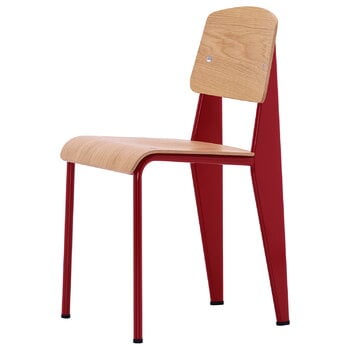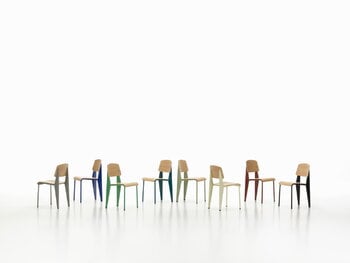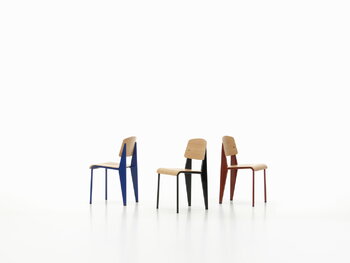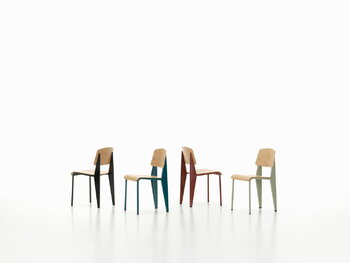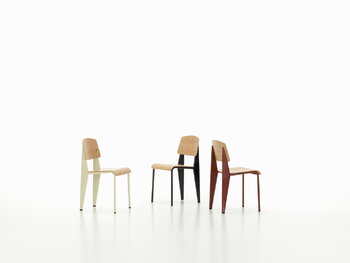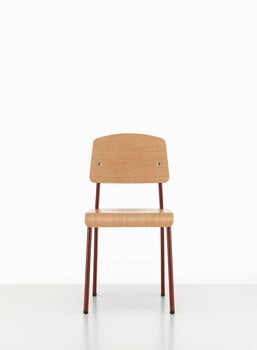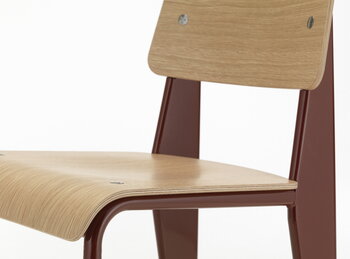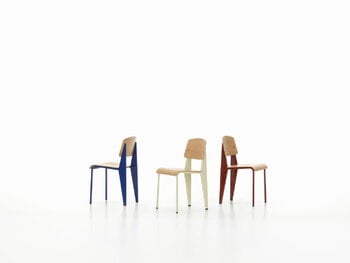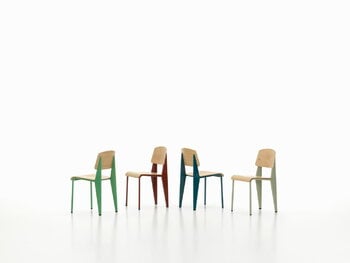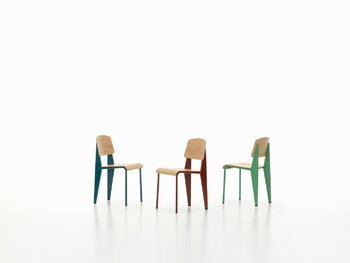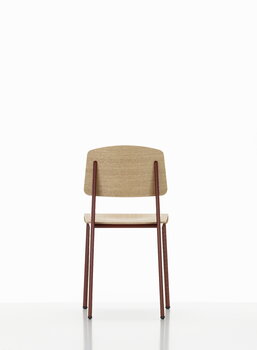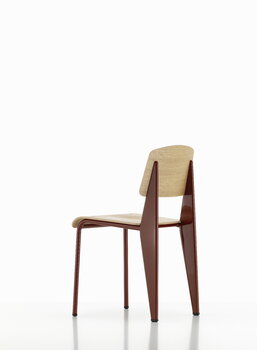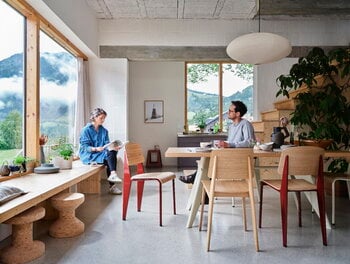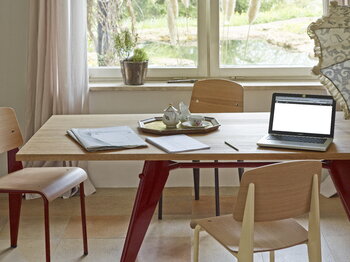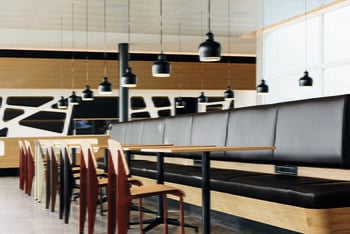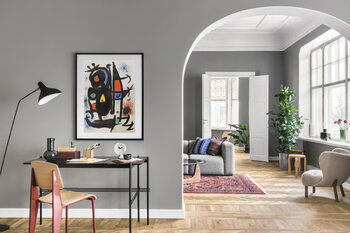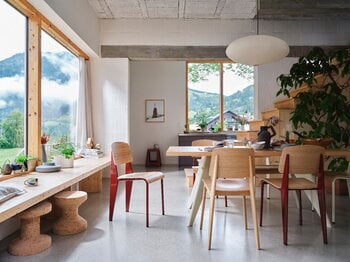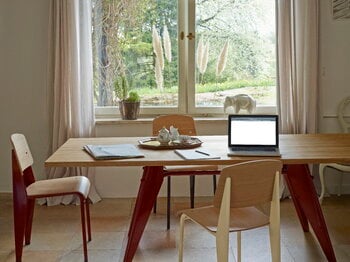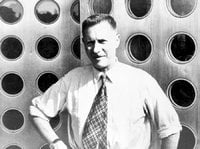Vitra’s Standard Chair, designed by Jean Prouvé in 1934, has a special metal structure inspired by Prouvé’s engineering background. Because most of the sitter’s weight is carried by chair’s back legs, Prouvé decided to place large, hollow steel legs to the back and slim ones to the front of the chair. With its pleasantly shaped plywood seat and back, the Standard Chair makes an excellent dining chair, and its design matches fluently with the EM Table designed by Prouvé.
Standard chair, Japanese red - oak
Vitra
Description
Vitra’s Standard Chair, designed by Jean Prouvé in 1934, has a special metal structure inspired by Prouvé’s engineering background. Because most of the sitter’s weight is carried by chair’s back legs, Prouvé decided to place large, hollow steel legs to the back and slim ones to the front of the chair. With its pleasantly shaped plywood seat and back, the Standard Chair makes an excellent dining chair, and its design matches fluently with the EM Table designed by Prouvé.
Product details (9)
- Colour
- Red, natural oak
- Width
- 42 cm
- Depth
- 49 cm
- Height
- 82 cm
- Seat height
- 46.5 cm
- Frame material
- Bent steel with powder coated finish
- Seat material
- Oak plywood
- Backrest material
- Oak plywood
- Warranty
- 10 years (product must be registered at manufacturer's website within 3 months of the purchase date)
Designer
Jean Prouvé (1909–1984) was a French metal artisan, engineer and self-taught architect and designer, who had a great influence on European post-war design and design philosophy. Social conscience and easy accessibility were essential starting points for Prouvé’s designs, which were often based on prefabricated housing, modular systems and mass-production.
Prouvé opened his own workshop in Nancy, France in 1924, and later expanded it into a furniture factory. Prouvé’s designs were widely used in French public institutes, and his prefabricated houses known as 'Maison Tropicale' were also sent to French colonies in Africa in mid-twentieth century. His background as a metal worker and engineer characterizes his best known designs, such as the Standard chair and Em table currently produced by Vitra.
View all productsReviews (1)
5
Based on 1 reviews
-
E
Eric B
Elwood, Australia
Great chair. Just what I wanted
76 days ago
Sustainability
The Product Sustainability Framework, our criteria of sustainable design, helps you find the most sustainable products in our selection. Read below which sustainability criteria this product has met.
Working conditions & labour 7/9
-
Equal opportunities for all employees
-
Commitment to UN Global Compact, fair compensation for all employees
-
Corporate responsibility requirements defined and communicated for suppliers
-
Systematic work for improved inclusion and well-being in the workplace
-
Transparent supply chain
-
Suppliers' compliance to a code of conduct ensured
-
Compliance to the UN Guiding Principles on Business and Human Rights ensured in the supply chain
-
Direct suppliers audited and certified
-
Support for community involvement in the supply chain
Eco-friendly production 7/9
-
Fair and resource-wise water-use in production
-
No incineration or landfilling of returned items
-
No use of endangered species as materials
-
No direct environmental emissions or waste (excl. GHGs) from production
-
Production and material sourcing that respect biodiversity, animal rights, and natural ecosystems
-
Material-efficient and ecological packaging
-
No potentially harmful chemicals used in own production
-
The sustainability of direct suppliers' production is addressed and monitored
-
Positive impact on nature’s well-being through operations that regenerate natural ecosystems
Climate impact 5/8
-
Company's direct greenhouse gas emissions identified and commitment to reduction
-
Product's carbon impact identified and commitment to reduction
-
Guidance on energy- and eco-efficient use of the product
-
Contribution to climate initiatives beyond the brand’s direct operations
-
100 % renewable energy in own production and operations
-
Low-carbon or compensated transportation
-
Carbon footprint of the product calculated and goals set to reduce it
-
Carbon neutral or carbon negative product
Sustainable materials 5/6
-
Sustainable and long-lasting material choices
-
No harmful or hazardous substances
-
Responsible raw material sourcing and production
-
Materials suited for circularity: monomaterials, recyclable finishings, renewable or recycled contents etc.
-
Ecological materials: natural, biodegradable, recyclable or recycled contents
-
Outstanding materials in terms of innovativeness, responsibility, sustainability and circularity: local production or sourcing, 100 % recycled content, C2C-certification etc.
Circular design 5/5
-
High aesthetic quality promoting long-term use of the product
-
Technically durable product design and material choices
-
Design for enduring life-long quality
-
Design and support for product maintenance, repair and upgradability
-
Innovative circular design solutions: circular service system, resale platform, remanufacturing, collection of used products, etc.
Chat to us online
Please enable functional cookies to use this feature. You can change your cookie settings at any time.
